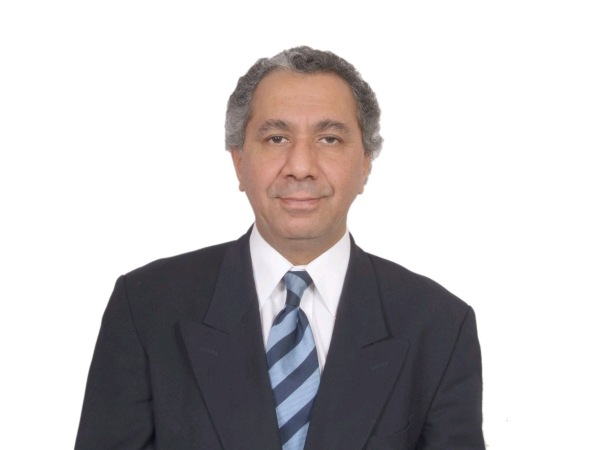
Advocate Deepak Khosla has filed a writ in the Calcutta high court to get Khaitan & Co to drop “& Co” from its name and for the high court to dismiss 20 years of pending and disposed of cases in which the firm acted.
Khosla also prayed for criminal contempt proceedings to be initiated against all partners and retainers of the firm, whose licenses he wants cancelled by the West Bengal bar council.
In January, Khaitan & Co had challenged Khosla’s right to act for Hungerford Investment Trust in a case against Turner Morrison, for which Khaitan & Co had been acting since 2005.
Khaitan argued that under the Calcutta High Court (Original Side) Rules 1914, Khosla did not have the right to practice on the original side of the Calcutta high court, because he was not enrolled with the West Bengal bar council but with the Karnataka bar council.
Khosla challenged those rules, which take away his right to practice on the original side of the high court, and retaliated further by filing a writ before the high court under the same rules, challenging Khaitan retainers’ and briefed counsel’s and senior counsel’s right to appear for the defendants in the case.
He has also argued that a law firm could only be named after its partners and could not have “& company” in its name, and that those partners alone should be permitted to act for a client of their firm.
Khosla said that at the hearing on 20 February, Justice Sanjib Banerjee recused himself because he had previously worked at Khaitan & Co.
Mumbai-based Khaitan partner Rabindra Jhunjhunwala said that the firm had not yet been served with the writ and declined to comment further until it had studied the petition in detail.
Khaitan fires first Calcutta HC Rules salvo…
At a 9 January hearing in the Hungerford matter, Khosla alleged that the Khaitan lawyers “to his shock … instead of allowing the long-pending matter to proceed on its merits… tried their level best to thwart his right to practice his profession, by raising all sort of frivolous and vexatious objections to his appearance in the Court as an ‘advocate’. Chiefly, they objected that as per Chapter I of the Original Side Rules, he could not practice on the Original Side of this Hon'ble Court, on the grounds that his name had not been inserted in the Register required to be maintained by” the Calcutta high court.
Khaitan & Co Kolkata senior associate Ratnesh Rai then sent a letter on 16 January to Calcutta high court chief justice, complaining, among other things, that Khosla was practising illegally before the Calcutta high court’s original side under the high court’s 1914 rules.
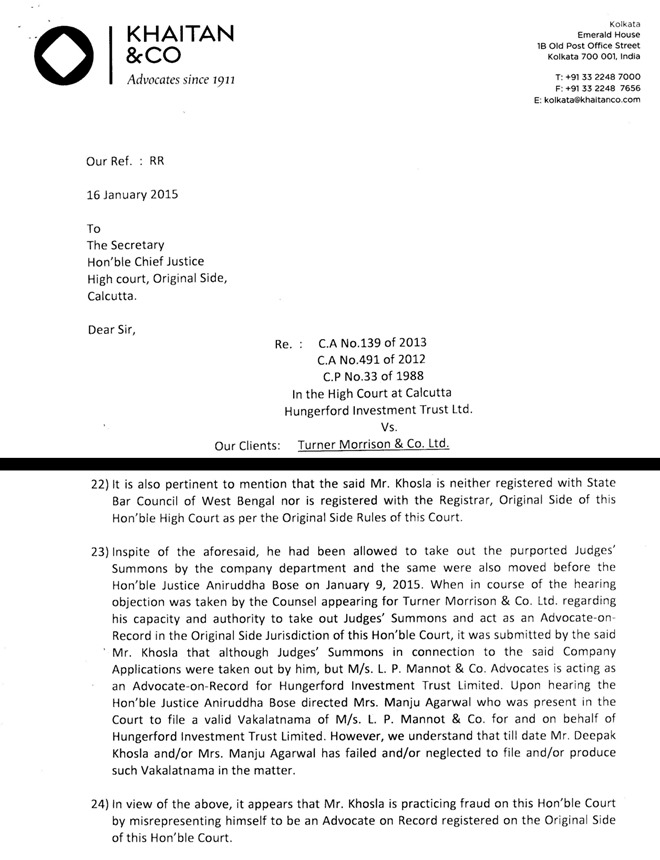
[Click here to read full letter]
The letter asked for an investigation “into the conduct and authority of Mr Khosla to act as an Advocate-on-Record in the Original Side Jurisdiction of this Hon’ble Court and also to represent and/or appear before the Court”.
Rai told Legally India: “[Khosla] is not legally permissible to practice on the original side of the Calcutta high court as he is not enrolled with the bar council of West Bengal. He is enrolled somewhere in Karnataka.”
Khosla responded: “Mr Ratnesh Rai is not a partner of Khaitan & Co. […] therefore, he cannot, as an advocate, represent or act for or on behalf of Khaitan & Co in any court of law. His doing so is a conscious and deliberate act of fraud, being ‘unlawful representation’.
“Moreover, he himself is not registered with the Ld. Registrar (Original Side) to practice on the Original Side. Yet, he is appearing in proceedings, where he has no right to appear. Perhaps his own violations is what gives him the gall to object to my right to appear, without pausing for a moment to think and reflect as to what is the significance of Section 30 of the Advocates Act having been notified with effect from 15-06-2011.”
Rai also alleged in his letter that Khosla had been abusing the judges and using offensive language; Khosla responded that he would prove that this was untrue, because the court had ordered the hearings transcribed by stenographers.
Khosla filed two writ petitions – WP 69 of 2015 and WP 70 of 2015 – respectively challenging Khaitan’s ability to practice under the 1914 rules, and challenging certain sections of the rules themselves.
1914 rules barring Khosla from Cal HC in conflict with Advocates Act?
On 9 January, Khosla had applied to the Calcutta high court registrar to include his name in the register maintained under Rule 2(i) of the 1914 rules, which lists the names of all advocates allowed to practice on the original side of the high court. However, the registrar rejected Khosla’ application because Khosla was not a West Bengal enrolled advocate.

Rule 2(i) requires that an advocate’s date of enrolment with the West Bengal bar council be mandatorily furnished in order for their enlistment on the register. In his application seeking registration, made to the high court’s registrar, Khosla had stated that though he is enrolled as an advocate with the Karnataka bar council he should be registered because Section 30 of the Advocates Act is an overriding provision that allows him to practice as an advocate throughout India.
In his writ (WP 70 of 2015) filed on 22 January, Khosla asked the Calcutta high court for a direction to either strike down Rule 2(i) as being in violation of Sections 30 and 50 of the Advocates Act 1961 and of Article 19(1)(g) of the Constitution of India, or to interpret the term “with the bar council of West Bengal” as “with the bar council of West Bengal or such other bar council as duly designated by the bar council of India under the Advocates Act 1961”.
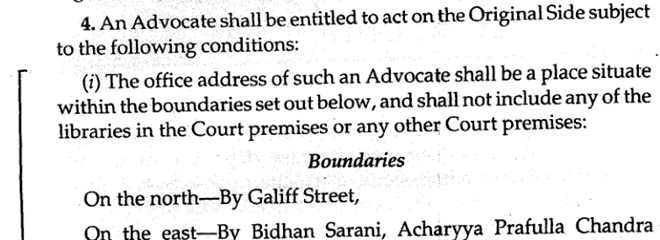
He also challenged rule 4(i), which requires that Calcutta high court original side advocates have to have an office within a geographic area described in the rules.
Khosla fires back with Cal HC Rules
In WP 69 of 2015, Khosla then argued that the original side rules, which Khaitan & Co had asserted against him, had been “flagrantly violated” by the firm itself, specifically “Rule 2, Rule 5, Rule 6, Rule 8, Rule 9(a), Rule 9(b), Rule 9(c), Rule 9(g), Rule 9(f), Rule 9(g), Rule 14, Rule 17, and so on”:
“it is the Respondents’ own case that all persons who do not qualify by these Rules, even if it be themselves, must be denied permission by the Ld. Registrar (Original Side) from acting, including appearing, on the Original Side, as set out in Rule 8.”
[Read the relevant parts of the Calcutta High Court (Original Side) Rules 1914]
On top of that, Khosla asserted that a non-partner in a firm could only act independently for a client and could not act for a client if that client was a law firm’s client.
“Respondent No. 5 (Mr. Ratnesh Rai) cannot effect appearance in CP No. 33 of 1988, as he is not a Partner of Respondent No. 4, and therefore, cannot accept any vakalatnama issued in favour of the firm. This being so, in absence of filing of a vakalatnama, he cannot act in a given matter on the Original Side.
He has also challenged senior advocate Utpal Bose’s and advocate Joy Saha’s right to appear for Khaitan’s client after being briefed by Khaitan, on the ground that Khaitan & Co itself has no right of audience before the Calcutta high court. He has also prayed for contempt proceedings to be intiated against Bose and Saha.
[Read WP 69 against Khaitan & Co and others]
Ban on law firms’ use of & Company
Khosla argued that Indian law firms must drop “& Co” from their names because a law firm was not a business but a professional service firm, using “and Company” would mislead the public as to the number of partners in a firm, and it could not “replace the need to place the names of all the partners” in the firm’s name.
He also relied on rules of the Karnataka high court and the Kerala high court, which explicitly ban the use of “and company” in partnerships (clause 8(d) of the Karnataka rules).
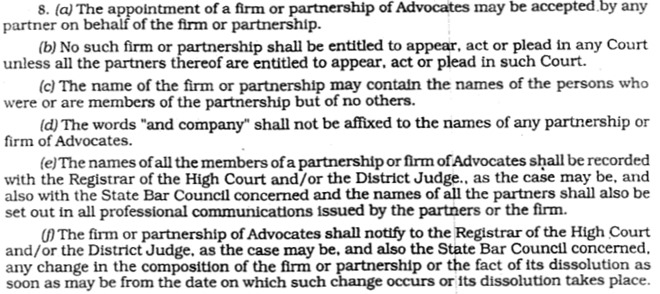
Khosla asserted that constitutional propriety demanded that the Calcutta high court should not belittle the rules of its sister high courts.
He also added:
A firm [which uses a name that does not reveal who its partners are] would be in breach of the letter as well as the spirit of Rule 9 (c) of the Calcutta High Court (Original Side) Rules, 1914.
even though there may be no such express / explicit prohibitory provision in the rules framed by the Hon’ble High Court of Calcutta, nonetheless, were the Hon'ble Calcutta High Court to consider allowing them to use the suffix ‘…& Company’ in their name when that constitutes a blatant violation of the Rules of Practice of another High Court, would mean a shocking state of a Constitutional High Court condoning, or being expected to condone, the very acts that constitute illegal conduct before another sister Constitutional High Court, if not outright encouragement of such illegal conduct.
Furthermore, he argued, that in violation of clause 9(d), Khaitan & Co had never updated its records with the Calcutta high court. Out of the 14 partners named on the firm’s letterhead, only two partners’ names were registered with the Calcutta high court’s original side registrar in 1977 when the firm had only eight partners, wrote Khosla.
The law firm should therefore be debarred from practice under rule 16, he said.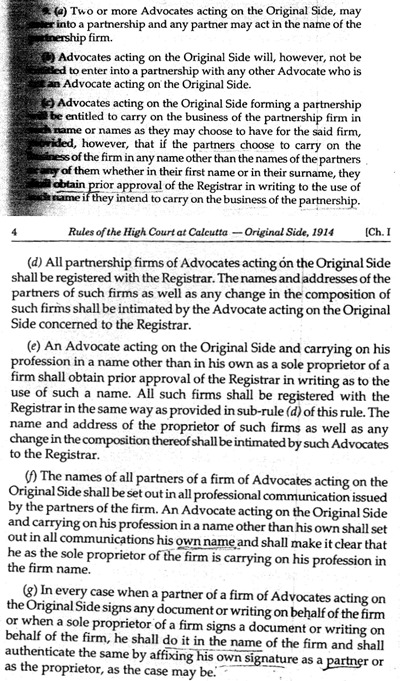
Forgery and contempt
He has also argued that under the Calcutta high court rules only a law firm’s partner can sign a pleading on behalf of a litigant, and that too in his own name and not in the name of the firm. If a non-partner signs the name of the firm on the pleadings in a matter, then he should be liable for forgery and contempt of court, argued Khosla:
Rule 9 (g) of the Calcutta High Court (Original Side) Rules (1914) stipulates that “In every case when a partner of a firm of advocates acting on the Original Side signs any document or writing on behalf of the firm, or when a sole proprietor of a firm signs a document or writing on behalf of the firm, he shall do in the name of the firm and shall authenticate the same by affixing his own signature as a partner or as a proprietor, as the case may be. In blatant violation of this rule, it appears that [Khaitan & Co], in order to deceive the courts, has been scribbling the phrase ‘Khaitan & Co’ at the place where the filing individual is supposed to affix his own signature.
[…] the signing advocate knows that the signature on the pleading is that to be of a Partner only, and by executing the phrase “Khaitan & Co” in his own handwriting in the pleading where the partner is to sign, he has purported that the pleading has been signed by a Partner of Khaitan & Co. in order to render the pelading or motion eligible to be filed in this Hon'ble Court and placed for judicial consideration.
That being so, such reprehensible conduct squarely meets the definition of creation of a “false document” within the meaning of Section 464 of the Indian Penal Code, and therefore, of a “forgery” within the meaning of Section 463 of the same Code, and both the executant and all the partners of Khaitan & Company at the relvant time(s) are liable for criminal prosecution for this reprehensible act of forgery, for a violation of the Indian Penal Code, as well as for criminal contempt under the Contempt of Courts Act (1971) read with Article 215 of the Constitution, as well as for blatant professional misconduct under the Bar Council Rules.”
Redemption
Khosla prayed for Khaitan’s litigation record of the last 20 years being dug up and its partners and retainers being suspended and debarred from practicing.
Khosla argued that Khaitan & Co should not be allowed to allege “spite and/or vendetta” against him, because they were first to invoke the Calcutta high court’s rules, and that “before pointing their own learned fingers at others, they would have done well to have remembered the old adage, namely, that one must be careful before pointing a finger at another, lest three of your own fingers point back at you”.
Among his reliefs sought he prays to:
compel the Respondent No. 1-3 [Registrar (Original Side)] to ascertain from all filings effected by Respondent No. 4 in the last, say, 20 years (including disposed-off matters) whether the same was signed by its duly-registered Partner or not, and by affixation of the partner’s own signature (while signing as partner for Khaitan & Co.), or whether the name of the firm “Khaitan & Co” was affixed across the pleading by hand as if to purport it to be a signature, and if the latter, to ascertain the name of the person who abusively signed the same, and to bring all such instances to the attention of the Hon’ble Courts concerned to enable them to dismiss all such pleadings, and initiate suo motu proceedings for criminal contempt against all the offenders, which would include such signatory, as well as all the partners of Khaitan & Co. at the relevant time…
compel the Respondent No. 8 (Bar Council of West Bengal) to examine the conduct of Respondent No. 4, and Respondent No. 5 to 7, and acting suo motu, take cognizance of gross and vile professional misconduct on their part, to lead to cancellation of licence of all the advocates who are partners, associates, employees of Khaitan & Co to practice the law, and pending cancellation of their licences, they all be suspended from the Council from the date of filing of the present petition, or from such other date this Hon'ble Court may deem fit.
In December 2014, Delhi high court Justice Sanjeev Sachdeva banned Khosla from filing matters or appearing in a number of Delhi courts by himself without another counsel, citing a litany of complaints and cost orders from the bench against the advocate, who has become well-known for his often combative and unconventional approach to advocacy.
threads most popular
thread most upvoted
comment newest
first oldest
first
All marks to Khosla for atleast someone has done the research before filing the petition.
Shame on both.
Koi Kisi ka much nahin ukhad payega.
Better for both to withdraw their initiatives, at least for brotherhood.
Well, if Mr. Deepak Khosla's writ succeeds, Khaitan & Company may as well announce all days of the week as holidays, from here on !
Ha !
Were they expecting khosla to sit quitely, go on the backfoot and spend time defending himself ?
rule no. 1 is always to expect punches back, and if possible do best if the punches coming would hurt.
in the present case, all that has happened is litigation time that simply cannot (at least ethically) be billed.
some strategical thinking would have given perhaps better judgment than this unnecessary fight. not cool khaitan.
As for your statement about NDA's funds practice, are you really suggesting that their funds practice has lost its mojo because Khaitan took away Siddharth Shah? Nothing could be further from the truth. NDA still has the most respected and deepest funds practice.
Ghanta yaar. Sheweth ho ya Showeth - just shove it.
This raises an interesting issue for all firms who follow this line..
History in the re-making!
Going by the well researched arguments Khosla has submitted Khaitan is in deeper shit for the moment. If they raise pleas on these silly technical arguments they deserve to have their asses kicked on silly technical arguments.
It's sad when a premier law firm uses these below-the-belt arguments to stall litigation. Looks like their case has run out of steam. What will they argue next?? That Khosla's gown is not black but 85% charcoal-grey??
Good on, Mr Khosla. You have one more admirer.
This query is : Resolved
Author : Anuj jain
Posted 4 years ago
Yes, it is very much possible for a person to appear his own case in person or authorise any other person who is non-advocate to represent his case.
Explanation:-
THERE IS an old saying that it is the wearer who knows where the shoe pinches. So if you are an aggrieved or an affected party, and feel that you have a strong case to contest in the court of law, you are the better person who can plead the case and put forth your view point with authority, no matter whether you are an advocate or not. As a petitioner in person, you have a primary right to contest any of your civil or criminal case even without engaging an advocate.
According to Sunil Sethi, former president of Jammu Bar association, it is not necessary at all for a petitioner to engage a lawyer. In fact, an advocate is just a substitute and under order Three of Civil Procedure Code, an advocate is an attorney - a person appointed to act for the petitioner.
Sethi says that to appear in person in the court, one doesn’t require a law degree at all. “Even the petitioner can engage another person to plead the case. That other person also doesn’t require to be a lawyer. Simply, in such a case the permission of the court is required.
If a petitioner doesn’t have resources to engage a lawyer or cannot also plead of his own, in such case, he can approach Legal Aid committee who can engage an advocate for the petitioner on government expenses. These Legal Aid committees are at district level (headed by Sessions Judge) and at state level, headed by a judge of a High Court.
Sethi says that if a person wants to plead the case of his own, he doesn’t need to put on an advocate’s uniform. Further, if he can not write the writ petition, the same can be drafted by engaging an advocate, but the case in the court can be pleaded by the petitioner himself, if he wishes so.
It is not also necessary to engage an advocate for the entire case till it comes to its logical conclusion. “Even the petitioner has the right to change the advocate and engage another at any stage of case, opines senior Jammu and Kashmir High Court advocate SS Anand Lehar.
Dwelling upon criminal cases, Lehar says that no trial begins before an accused is given an opportunity to engage a lawyer. In case the accused is not in a position or doesn’t want to engage a lawyer, the court is bound to give him the services of an ‘Amicus Curie’- an advocate who will be asked by the Court to represent the case and the money for the same will be borne by the court.
If the accused neither engages the advocate nor takes the services of ‘Amicus Curie’, the Judge will be in that case himself examining the witness. Even the accused himself has the right to cross-examine the witnesses.
While giving reference of the law, Lehar says that under Article 21 of the Indian Constitution (seeking safeguard of life and liberty of an individual), even a foreigner can approach Indian Courts and that too without an advocate. Even those who have illegally come to India or detained after crossing the border, can seek justice under this provision and can plead for liberty if detained beyond the period of detention.
So the next time, when you are engaged in any legal dispute, be it a consumer case, a civil or a matrimonial dispute, if you are sure that you can plead the case of your own, you have the right to appear before the judge - but remember, maintaining the dignity of the court is everybody’s prime duty.
To activate Click to Talk, e-mail at
threads most popular
thread most upvoted
comment newest
first oldest
first